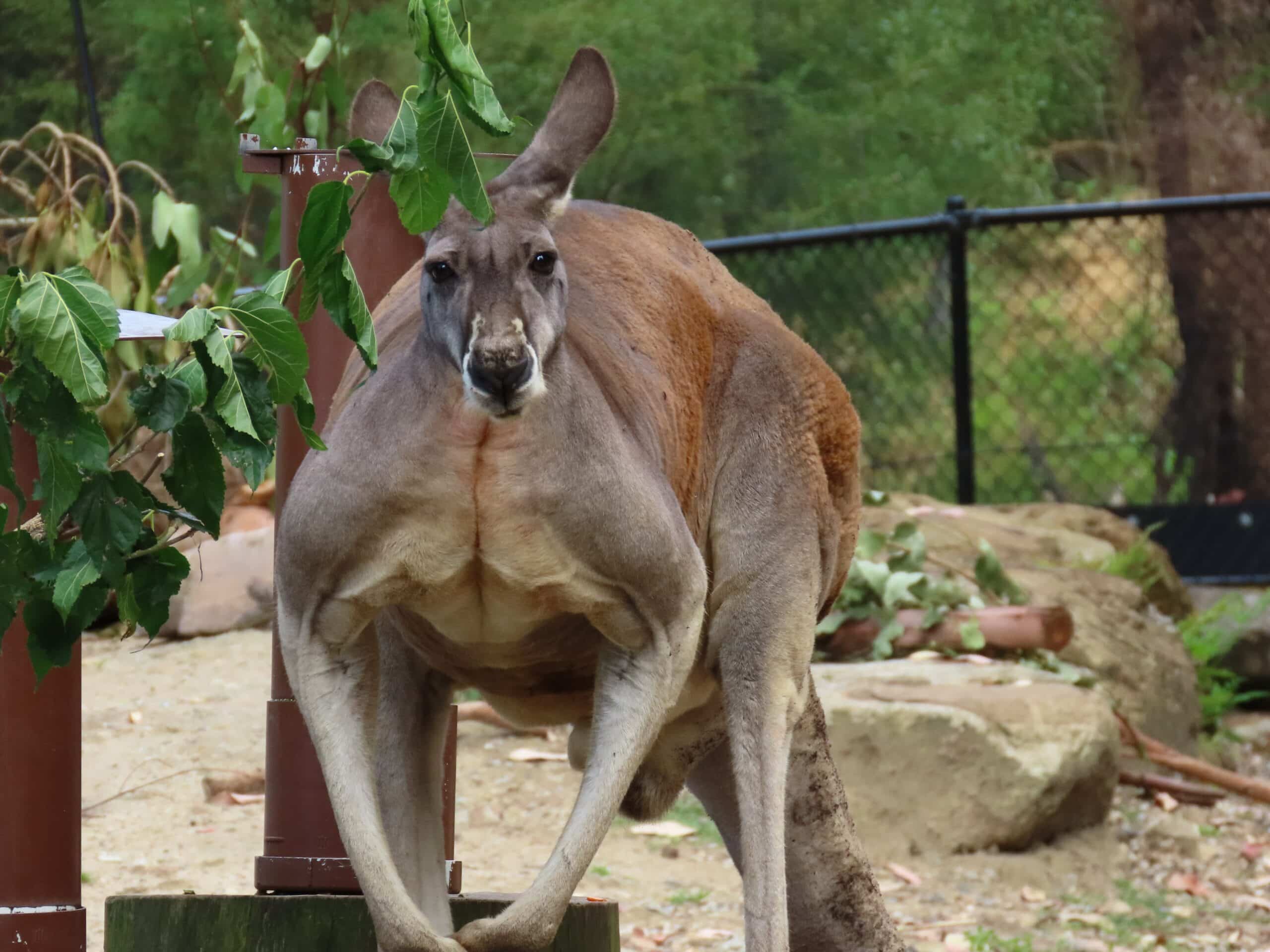
The Grand Stage Awaits: A Deep Dive into the 2026 FIFA World Cup Host Cities
The FIFA World Cup, football’s most prestigious tournament, is set to embark on an unprecedented journey in 2026. For the first time in its history, the global spectacle will be co-hosted by three nations – the United States, Canada, and Mexico – and will feature an expanded format of 48 teams competing across 16 vibrant host cities. This monumental undertaking promises not only a celebration of football but also a unique fusion of cultures, diverse landscapes, and state-of-the-art infrastructure.
The "United Bid," as it was known, successfully outmaneuvered Morocco to secure the rights for 2026, promising FIFA and football fans a tournament of unparalleled scale and spectacle. The decision to expand to 48 teams necessitated a broader geographical footprint and a greater number of high-capacity stadiums, making the three North American nations an ideal choice. With a combined population exceeding 500 million, a deeply entrenched sports culture, and a wealth of modern amenities, the stage is set for a truly historic event.
The 16 chosen host cities represent a carefully curated selection, balancing geographical spread, infrastructural readiness, historical significance, and the sheer passion for the beautiful game. Each city brings its own distinct flavour, promising a unique experience for players, officials, and millions of visiting fans.
The United States: The Epicenter of the Action
The United States, with 11 designated host cities, will serve as the primary hub for the 2026 World Cup, hosting the vast majority of matches, including the quarter-finals, semi-finals, and the grand final. These cities boast some of the largest and most technologically advanced stadiums in the world, coupled with robust transportation networks, extensive accommodation options, and a diverse range of entertainment.
The East Coast Powerhouses:
- New York/New Jersey (MetLife Stadium, East Rutherford, NJ): As one of the world’s most iconic metropolises, New York City, paired with its neighbour New Jersey, offers an unparalleled backdrop. MetLife Stadium, a colossal venue with a capacity of over 82,000, is a strong contender for the final match. The energy of NYC, its diverse population, and its status as a global financial and cultural hub guarantee an electrifying atmosphere. Fans can immerse themselves in world-class attractions, Broadway shows, and an endless array of dining experiences, all within easy reach of the stadium.
- Boston (Gillette Stadium, Foxborough, MA): Steeped in history and academic excellence, Boston provides a unique blend of old-world charm and modern vibrancy. Gillette Stadium, home to the New England Patriots, offers a state-of-the-art facility for World Cup matches. The city’s passionate sports fans, colonial architecture, and renowned culinary scene will create a memorable experience for visitors.
- Philadelphia (Lincoln Financial Field, PA): The "City of Brotherly Love" offers a rich historical tapestry, being the birthplace of American democracy. Lincoln Financial Field, a modern stadium, provides an excellent venue. Philadelphia’s vibrant arts scene, diverse neighbourhoods, and culinary delights, particularly its famous cheesesteaks, will be a draw for fans seeking a taste of authentic Americana.
- Miami (Hard Rock Stadium, FL): Miami brings the quintessential South Florida flair to the tournament. Known for its vibrant nightlife, stunning beaches, and strong Latin American influence, it promises a party atmosphere both on and off the field. Hard Rock Stadium is a world-class facility, regularly hosting major sporting events. The city’s tropical climate and unique cultural fusion will make it a popular destination.
The Central & Southern Giants:
- Atlanta (Mercedes-Benz Stadium, GA): A rapidly growing and diverse city, Atlanta has emerged as a major sports and entertainment hub in the Southeast. Mercedes-Benz Stadium is an architectural marvel, featuring a retractable roof and an iconic halo board, making it one of the most technologically advanced venues in the world. Atlanta’s accessibility, vibrant music scene, and delicious Southern cuisine will offer a distinctive experience.
- Dallas (AT&T Stadium, Arlington, TX): Everything is bigger in Texas, and AT&T Stadium is no exception. With a capacity exceeding 90,000 and a colossal video board, it’s one of the most impressive stadiums globally and a strong contender for a semi-final. Dallas’s robust infrastructure, booming economy, and deep-seated love for sports make it a formidable host. Fans can explore the city’s Western heritage, thriving arts district, and burgeoning food scene.
- Houston (NRG Stadium, TX): As one of the most diverse cities in the U.S., Houston offers a rich cultural mosaic. NRG Stadium is a versatile, high-capacity venue capable of hosting major matches. The city’s renowned culinary scene, particularly its Tex-Mex and BBQ, coupled with its vibrant arts and space exploration heritage, will provide plenty to explore for visiting fans.
- Kansas City (Arrowhead Stadium, MO): Often dubbed the "Heart of America," Kansas City offers a unique blend of Midwestern charm and big-city amenities. Arrowhead Stadium, famous for its roaring crowd and electric atmosphere, is an iconic venue. The city’s legendary BBQ, jazz music scene, and friendly disposition will undoubtedly captivate fans.
The West Coast Wonders:
- Los Angeles (SoFi Stadium, Inglewood, CA): Having previously hosted the 1994 World Cup final, Los Angeles is no stranger to the global stage. SoFi Stadium, a dazzling, cutting-edge venue, is set to be a major player in 2026. The city’s glamorous Hollywood allure, diverse cultural landscape, and sprawling urban environment promise a truly grand spectacle. Fans can enjoy world-class entertainment, beautiful beaches, and a vibrant culinary scene.
- San Francisco Bay Area (Levi’s Stadium, Santa Clara, CA): The innovative spirit of Silicon Valley meets the iconic beauty of the Bay Area. Levi’s Stadium, a modern, environmentally conscious venue, is strategically located within reach of San Francisco’s myriad attractions. The city’s stunning natural beauty, progressive culture, and technological prowess offer a distinct and memorable experience.
- Seattle (Lumen Field, WA): Known for its stunning natural landscapes, vibrant music scene, and tech industry, Seattle offers a unique Pacific Northwest flavour. Lumen Field, home to a passionate soccer fanbase (the Seattle Sounders), promises an incredible atmosphere. Fans can explore Pike Place Market, the Space Needle, and enjoy the city’s renowned coffee culture amidst breathtaking views.
Canada: Northern Hospitality and Passion
Canada will host matches in two of its most prominent and diverse cities, showcasing its welcoming spirit and growing passion for football. While their allocation of matches is smaller than the U.S., the Canadian hosts are poised to deliver an exceptional experience.
- Toronto (BMO Field, ON): As Canada’s largest city and a global hub for diversity, Toronto offers a truly multicultural experience. BMO Field, while smaller than many U.S. venues, is an intimate and passionate football-specific stadium, which will likely be expanded for the tournament. The city’s vibrant arts scene, world-class dining, and iconic landmarks like the CN Tower will provide ample entertainment for visitors. Its diverse population ensures a home-away-from-home feeling for fans from around the globe.
- Vancouver (BC Place, BC): Nestled amidst stunning mountains and the Pacific Ocean, Vancouver is renowned for its natural beauty and outdoor lifestyle. BC Place, an impressive stadium with a retractable roof, offers a superb venue for World Cup matches. The city’s eco-conscious ethos, lively downtown core, and proximity to breathtaking wilderness will offer a unique blend of urban excitement and natural wonder. Vancouver’s experience in hosting major events, including the 2010 Winter Olympics and the 2015 Women’s World Cup Final, makes it a reliable choice.
Mexico: A Rich Footballing Heritage
Mexico, a nation with a deep-rooted and fervent love for football, holds the unique distinction of becoming the first country to host the men’s World Cup three times (after 1970 and 1986). Its three host cities embody the nation’s rich history, vibrant culture, and unparalleled footballing passion.
- Mexico City (Estadio Azteca, CDMX): The iconic Estadio Azteca is a legendary venue, having hosted two World Cup finals. Its sheer history and capacity make it an indispensable part of the 2026 tournament. Mexico City itself is a sprawling, vibrant metropolis, rich in history, art, and culinary delights. Fans will be immersed in a truly authentic Mexican experience, from ancient Aztec ruins to bustling markets and world-class museums. The city’s passionate football culture is second to none, promising an electric atmosphere.
- Guadalajara (Estadio Akron, Jalisco): Known as the cultural heartland of Mexico, Guadalajara offers a more traditional and charming experience. Estadio Akron is a modern, environmentally friendly stadium located on the outskirts of the city. Guadalajara is the birthplace of mariachi music and tequila, promising a lively and authentic cultural immersion for visitors. The city’s beautiful colonial architecture and warm hospitality will undoubtedly enchant fans.
- Monterrey (Estadio BBVA, Nuevo León): As a major industrial and economic hub in northern Mexico, Monterrey brings a modern, cosmopolitan vibe to the tournament. Estadio BBVA, often called "El Gigante de Acero" (The Steel Giant), is a stunning, state-of-the-art venue with a distinctive design. Monterrey’s dynamic urban landscape, impressive mountain backdrop, and burgeoning culinary scene offer a different facet of Mexican culture.
The Unifying Power and Logistics
The sheer geographical spread of the 2026 World Cup presents unprecedented logistical challenges, particularly concerning team travel and fan mobility. FIFA and the host nations are actively working on strategies to mitigate these issues, including regionalized group stage play to minimize travel distances for teams and fans in the initial phases. The expansion to 48 teams also means more matches, offering a greater opportunity for fans to experience the tournament firsthand.
Beyond the logistics, the 2026 World Cup in North America is poised to be a powerful symbol of unity and cross-border collaboration. It’s a testament to the idea that sports can transcend political boundaries and bring people together. The cultural exchange between North, Central, and South American fans, and those from around the globe, will be immense. The tournament will not only showcase the beautiful game but also the unique identities and shared passion of three distinct nations.
Legacy and Impact
The legacy of the 2026 World Cup will extend far beyond the final whistle. Economically, it promises a significant boost in tourism, job creation, and infrastructure development across all host cities. Socially, it will inspire a new generation of footballers and fans, foster community engagement, and promote cultural understanding on an unprecedented scale. The improvements in transportation, hospitality, and public spaces will leave a lasting positive impact on the host regions for years to come.
As the countdown to 2026 begins, the anticipation builds for a World Cup that promises to be unlike any other. From the bustling streets of New York to the historic grandeur of Mexico City and the natural beauty of Vancouver, the 16 host cities are ready to open their arms to the world. This expanded, three-nation tournament is set to redefine the scale and impact of football’s greatest spectacle, leaving an indelible mark on the sport and its global fanbase. The stage is truly set for an unforgettable chapter in World Cup history.



